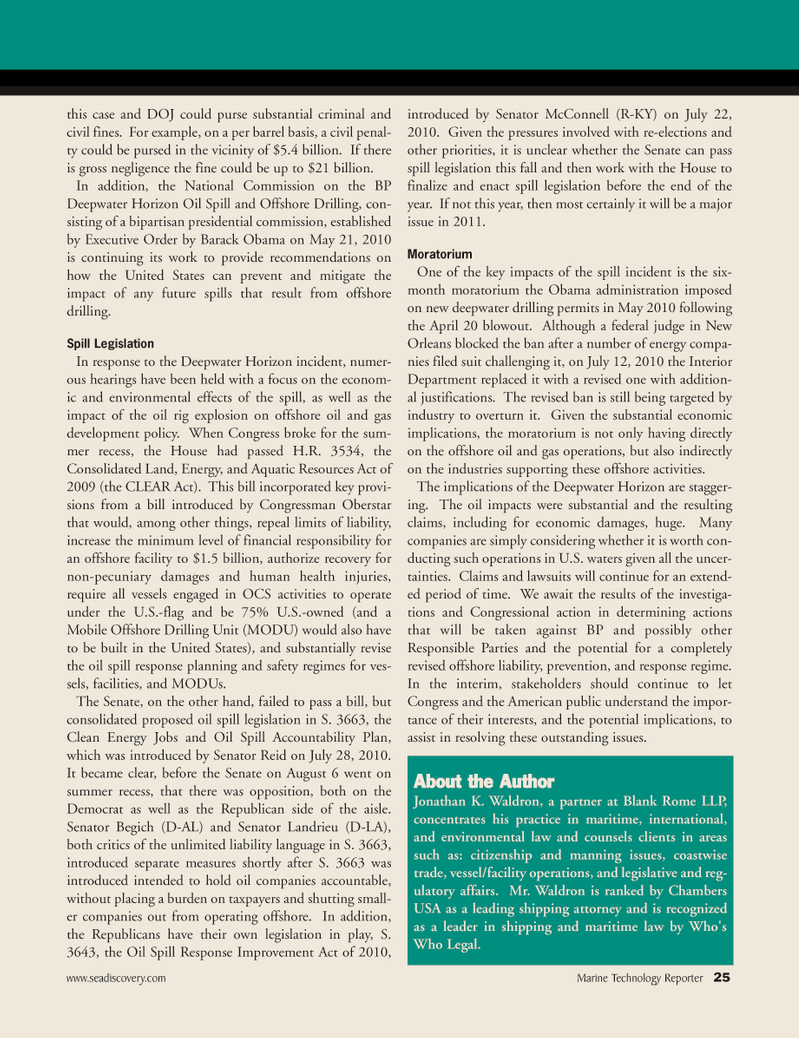
Page 25: of Marine Technology Magazine (October 2010)
Ocean Engineering & Design
Read this page in Pdf, Flash or Html5 edition of October 2010 Marine Technology Magazine
this case and DOJ could purse substantial criminal and civil fines. For example, on a per barrel basis, a civil penal- ty could be pursed in the vicinity of $5.4 billion. If there is gross negligence the fine could be up to $21 billion.
In addition, the National Commission on the BP
Deepwater Horizon Oil Spill and Offshore Drilling, con- sisting of a bipartisan presidential commission, established by Executive Order by Barack Obama on May 21, 2010 is continuing its work to provide recommendations on how the United States can prevent and mitigate the impact of any future spills that result from offshore drilling.
Spill Legislation
In response to the Deepwater Horizon incident, numer- ous hearings have been held with a focus on the econom- ic and environmental effects of the spill, as well as the impact of the oil rig explosion on offshore oil and gas development policy. When Congress broke for the sum- mer recess, the House had passed H.R. 3534, the
Consolidated Land, Energy, and Aquatic Resources Act of 2009 (the CLEAR Act). This bill incorporated key provi- sions from a bill introduced by Congressman Oberstar that would, among other things, repeal limits of liability, increase the minimum level of financial responsibility for an offshore facility to $1.5 billion, authorize recovery for non-pecuniary damages and human health injuries, require all vessels engaged in OCS activities to operate under the U.S.-flag and be 75% U.S.-owned (and a
Mobile Offshore Drilling Unit (MODU) would also have to be built in the United States), and substantially revise the oil spill response planning and safety regimes for ves- sels, facilities, and MODUs.
The Senate, on the other hand, failed to pass a bill, but consolidated proposed oil spill legislation in S. 3663, the
Clean Energy Jobs and Oil Spill Accountability Plan, which was introduced by Senator Reid on July 28, 2010.
It became clear, before the Senate on August 6 went on summer recess, that there was opposition, both on the
Democrat as well as the Republican side of the aisle.
Senator Begich (D-AL) and Senator Landrieu (D-LA), both critics of the unlimited liability language in S. 3663, introduced separate measures shortly after S. 3663 was introduced intended to hold oil companies accountable, without placing a burden on taxpayers and shutting small- er companies out from operating offshore. In addition, the Republicans have their own legislation in play, S. 3643, the Oil Spill Response Improvement Act of 2010, introduced by Senator McConnell (R-KY) on July 22, 2010. Given the pressures involved with re-elections and other priorities, it is unclear whether the Senate can pass spill legislation this fall and then work with the House to finalize and enact spill legislation before the end of the year. If not this year, then most certainly it will be a major issue in 2011.
Moratorium
One of the key impacts of the spill incident is the six- month moratorium the Obama administration imposed on new deepwater drilling permits in May 2010 following the April 20 blowout. Although a federal judge in New
Orleans blocked the ban after a number of energy compa- nies filed suit challenging it, on July 12, 2010 the Interior
Department replaced it with a revised one with addition- al justifications. The revised ban is still being targeted by industry to overturn it. Given the substantial economic implications, the moratorium is not only having directly on the offshore oil and gas operations, but also indirectly on the industries supporting these offshore activities.
The implications of the Deepwater Horizon are stagger- ing. The oil impacts were substantial and the resulting claims, including for economic damages, huge. Many companies are simply considering whether it is worth con- ducting such operations in U.S. waters given all the uncer- tainties. Claims and lawsuits will continue for an extend- ed period of time. We await the results of the investiga- tions and Congressional action in determining actions that will be taken against BP and possibly other
Responsible Parties and the potential for a completely revised offshore liability, prevention, and response regime.
In the interim, stakeholders should continue to let
Congress and the American public understand the impor- tance of their interests, and the potential implications, to assist in resolving these outstanding issues.
About the Author
Jonathan K. Waldron, a partner at Blank Rome LLP, concentrates his practice in maritime, international, and environmental law and counsels clients in areas such as: citizenship and manning issues, coastwise trade, vessel/facility operations, and legislative and reg- ulatory affairs. Mr. Waldron is ranked by Chambers
USA as a leading shipping attorney and is recognized as a leader in shipping and maritime law by Who's
Who Legal. www.seadiscovery.com Marine Technology Reporter 25

 24
24

 26
26
